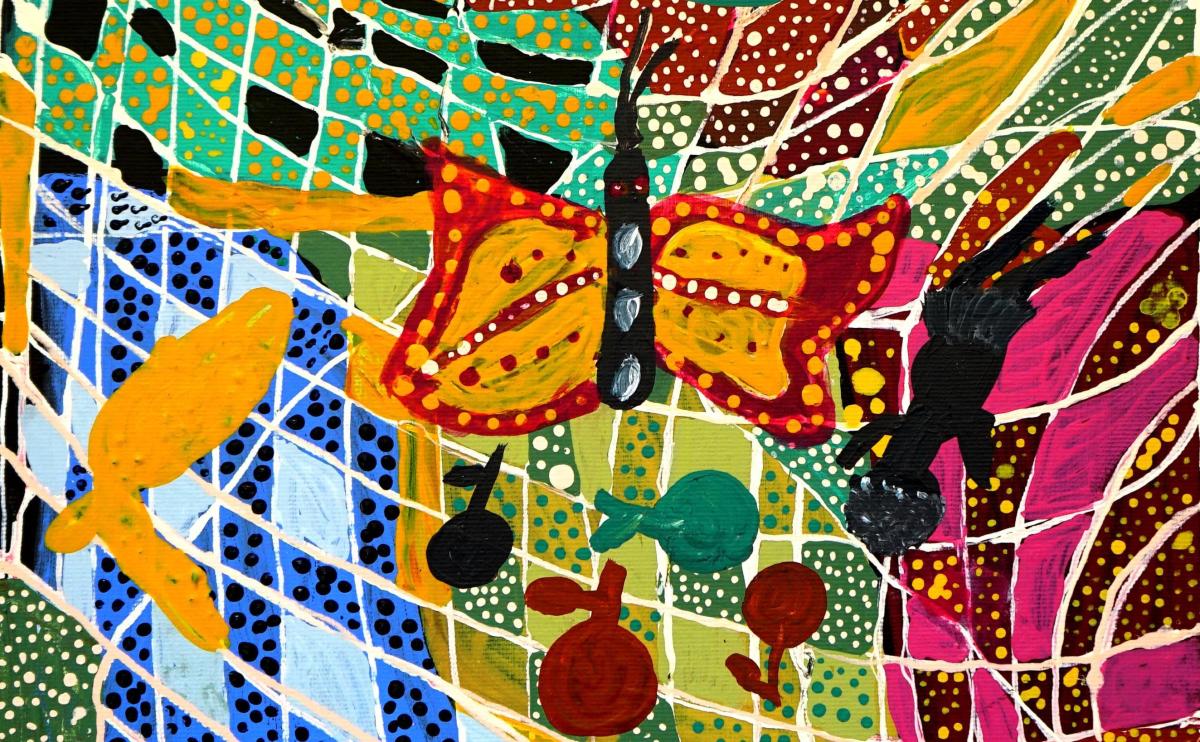Cultural safety is at the cornerstone of the Arlpwe Art and Culture Centre as it provides am environment for community members to keep and share their traditions and heritage. Located in Ali Curung, just 378-km north of Alice Springs, the name Arlpwe (pronounced Arlboe) came from the traditional landowners meaning, ‘this country all over, no waterhole, no rivers, only soakage and spinifex country’.
Opened in 2007, Arlpwe allows men and women from the Warlpiri, Kaytetye, Alyawarr, and Warumungu language groups to come together to learn about each other, work together and build frameworks for living together harmoniously. Arlpwe is proudly one hundred percent owned by First Nations people and eighty percent of the board members are also practising artists.
‘For more than ten years now, we have been running diverse cultural and social projects to [foster] community wellbeing,’ says Arlpwe manager Diane Din Ebongue.
The art centre is currently working on a new iteration of its cultural festival, to begin on 9 June. It will feature an exhibition of paintings, artefacts, jewellery and crafts, plus a significant dance performance and creative workshops.
‘The Ali Curung community has held cultural dance festivals in the past,’ Din Ebongue said. ‘After many Elders in the community passed away, the event was put on hold and it was difficult to maintain a strong culture. To bring back this strength, we have invited traditional owners from other lands to participate in the creation of the new festival.’
The aim is to make the new ARTALI Festival an annual event and a significant fixture on the Ali Curung calendar. To do so, Arlpwe is prototyping new collaborative models for the festival designed to develop non-formal education, social inclusion, professional integration and creativity.
‘We want to guarantee a quality festival, which is difficult in the current climate, so we completely updated our approach with a focus on creative workshops and professional development. Ali Curung residents envision an outstanding cultural festival that brings together people from all over Australia,’ Din Ebongue said.
There are weekly arts workshops open to community members and visitors throughout the year at Arlpwe. Facilitated by local artists, workshops offer the opportunity to discover traditional art practices and appreciate some of the culture behind the art. Works are for sale with all purchases made at either the art centre or their online shop support the local community with sales shared with artists.
Among the range of workshops, Bring Your Own Object sees participants working with an artist to customise their a found object or an item bought in the gallery using acrylic paints. There is also the Arlpwe Book of Colours exploring the perception of colours in contemporary First Nations art, which focuses on specific themes, such as red dust, desert flowers, skylight, or waterhole as a catalyst for working with different textures and combinations of colours.
There are a number of established Aboriginal artists working at the Centre, including Judy Long and Martha Poulson who were part of the Desert Mob 2020 exhibition at the Araluen Arts Centre. Din Ebongue appreciates the perspectives they bring: ‘Judy uses dot paintings to represent her country and the Ali Curung community. Martha’s paintings are rich and diverse, from landscape and bush tucker to scenes of everyday life. She has a colourful and modern style. And among our emerging artists are Marlene Murphy and Warrick Miller.’
Visitors and locals are encouraged to visit ARTALI, the NT’s newest arts Festival in June, and experience the depth of art at Arlpwe.
Find out more about the festival including forthcoming program details on Arlpwe website.





